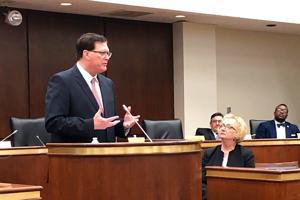South Carolina bill establishing Education Scholarship Accounts draws widespread Republican support

(The Center Square) – Sixty-three House Republicans have signed onto a bill spearheaded by House Speaker Jay Lucas to establish Education Scholarship Accounts (ESAs) in South Carolina.
The South Carolina Education Scholarship Account Act, House Bill 3976, was filed Wednesday and referred to House Ways and Means Committee.
“Now, more than ever, it has become profoundly obvious that in order for the children of our state to succeed, we must provide them with the option to pursue the education that best suits their individual needs,” said Lucas, R-Darlington. “This legislation opens the door for the parents of our state’s most vulnerable children to make the choices that will maximize their child’s educational opportunities.”
Under HB 3976, parents of eligible students will receive a flexible education grant they can use to “customize” their child’s education through an online, parent-directed account to pay tuition at private and charter schools.
Among those eligible for ESAs are students in families that earn 200% of the federal poverty level, Medicaid recipients, students enrolled in the South Carolina Early Reading Development and Education Program or prior Exceptional South Carolina students.
“We are excited to announce that legislation to create Education Scholarship Accounts (ESAs) has now officially been filed in the South Carolina House,” Palmetto Promise Institute Policy Content Manager Lawson Mansell wrote in an email. “And 63 lawmakers – that’s over HALF of the House – have signed on as co-sponsors to express their support. If passed, the South Carolina Education Scholarship Account Act would be a game-changer for qualified families.”
Creating ESAs as part of school-choice expansion has been on South Carolina Republicans’ radars for years. House Bill 3681 was introduced to fanfare in 2019 with 58 House cosponsors, including several Democrats, but failed to gain traction in committee reviews.
HB 3976 has no Democratic cosponsors and all but 18 of the House’s 81 GOP members have signed on. Republicans hold an 81-43 advantage in the 124-seat chamber.
In anticipation of fight to get the measure adopted, Palmetto Promise, a conservative think tank, is asking South Carolinians to contact lawmakers to express support for ESAs.
“Lawmakers will face stiff opposition for supporting this legislation,” Mansell wrote. “They need to know that we have their backs.”
Five states have active ESA programs: Arizona, Florida, Mississippi, North Carolina and Tennessee, although Tennessee’s pilot program is tied up in court. Similar bills to create ESAs have been filed this year in Indiana, West Virginia and Missouri, while Arizona and Florida are looking to expand their ESA programs.
Pennsylvania lawmakers are debating using federal COVID-19 relief funds to establish an ESA program.
Under HB 3976, ESAs would be funded with state dollars allocated per student to school districts. That was approximately $6,446 per student in the state’s fiscal year 2021 budget.
Federal and local funds would remain with school districts in which the ESA student resides.
Children whose family income is up to 200% of federal poverty guidelines would be eligible. For a family of four, that is up to $52,400 in annual household income.
Under the bill, ESAs are capped at 5,000 kindergarten through third-grade students during the 2022-23 school year. The cap increases to 10,000 kindergarten through fifth-grade students in the 2023-24 school year, 15,000 kindergarten through eighth-grade students in the 2024-25 school year and 20,000 kindergarten through 12th-grade students in the 2025-26 school year.
Beginning the 2026-27 school year, all K-12 students would be eligible.
Disclaimer: This content is distributed by The Center Square


